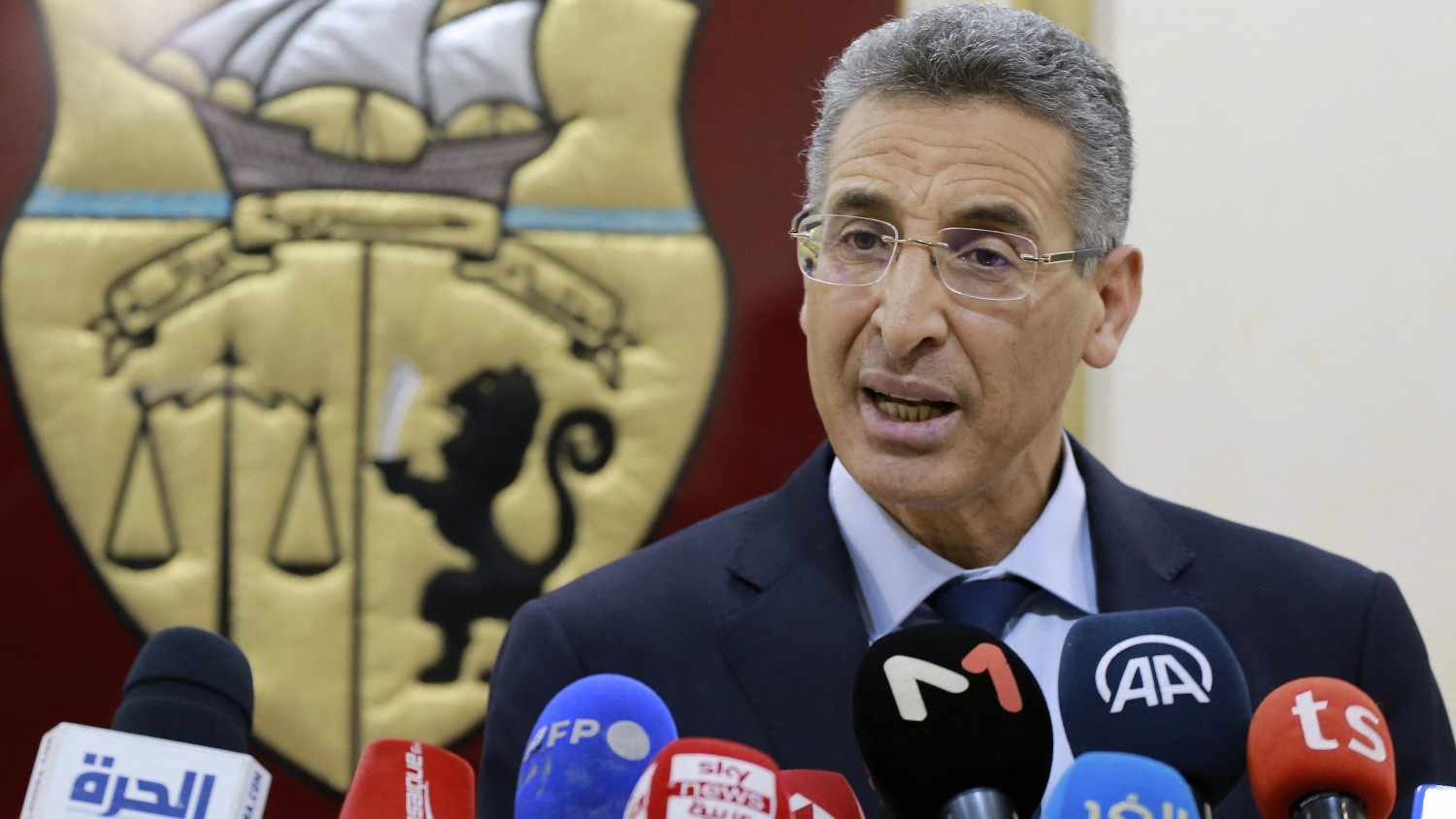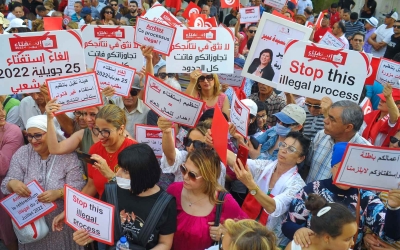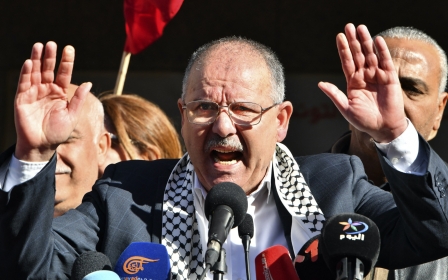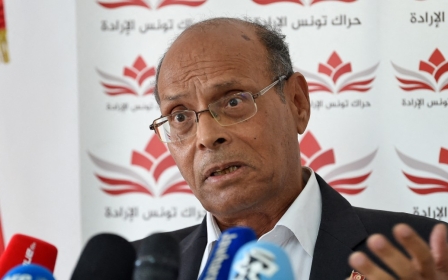Senior Tunisian officials face US lawsuit over alleged torture, extrajudicial killing

Two Tunisian citizens have filed a lawsuit in Washington against the country's interior minister and the head of the presidential guard, accusing them of playing a role in the alleged "abduction-style detention" and torture of a lawyer as well as the extrajudicial killing of a protester in January 2022.
The civil lawsuit, filed on Wednesday evening in the US District Court for the District of Columbia, names both Tunisian Interior Minister Taoufik Charfeddine and Khaled Yahyaoui, a presidential guard member.
It was filed by Seifeddine Bouzayene, the son of the protester who was killed, and Noureddine Bhiri, the lawyer who was detained and allegedly tortured by the Tunisian security forces.
The lawsuit claims jurisdiction under a US code that states an alien can file a lawsuit in a district court for civil liability if the allegation is a "violation of the law of nations or a treaty of the United States".
Bhiri, a senior official from Ennahda and former justice minister, claims in the lawsuit that at the end of December 2021 while driving to his office, he was abducted and then illegally detained in "deplorable conditions in an unofficial holding cell", and then transferred to hospital after his health significantly deteriorated.
New MEE newsletter: Jerusalem Dispatch
Sign up to get the latest insights and analysis on Israel-Palestine, alongside Turkey Unpacked and other MEE newsletters
The interior ministry said he was detained due to alleged illegal submission of passports and nationality documents and suspicion of terrorism, charges that Ennahda dismissed as politically motivated.
The lawsuit states that he was detained without charges for 67 days and "suffered grave physical and emotional damage".
Middle East Eye reported that at the time he was in hospital, Bhiri, who had preexisting health conditions, was "between life and death", according to his family members.
The lawsuit says that the individuals responsible for his detention were under the command of Charfeddine and Yahyaoui.
In January, the UN expressed concerns and demanded Bhiri be either charged or freed.
The lawsuit also states that on 14 January Bouzayene's father was participating in a demonstration commemorating the anniversary of the 2011 Tunisian revolution as well as protesting the current government's ban on public gatherings.
During this protest, Bouzayene says that security forces used excessive violence against demonstrators, including "tear gas, sticks, and water cannons", and his father died as a result of the force used by security forces. The death was reported by Al Jazeera at the time.
"Defendants Charfeddine and Yahyaoui are personally liable for, or exercised command responsibility over, or conspired with, or aided and abetted, internal security forces, members of the National Guard, Presidential Security, and law enforcement personnel that are directly involved in disproportionate and lethal use of force against civilians," the lawsuit reads.
The lawsuit was also filed on the same day that Tunisia's president, Kais Saied, was visiting Washington for a meeting with the Biden administration under the auspices of the US-Africa summit.
During a meeting with US Secretary of State Antony Blinken, Saied defended his decision to freeze parliament, saying he was "saving the Tunisian nation" which was "under the brink of civil war".
Tunisia is headed toward parliamentary elections this week, but many in the opposition have criticised the vote, saying the new legislature will have few powers.
Mongi Dhaouadi, president and founder of the Tunisia United Network (TUN), which is a lead consultant on the lawsuit, told Middle East Eye that the case was filed on Wednesday in the US in part because Bhiri has been trying to file a case in Tunisia without any success.
And with Saied visiting the US, the two Tunisian citizens wanted to show that the Tunisian president and his government are responsible for a litany of rights abuses.
"It's important that we highlight these cases, these abuses, in the hope that some of these victims will get justice," Dhaouadi told Middle East Eye.
"We would like to see these cases prosecuted in Tunisia. That's the normal way. However, we know for a fact that for example, Mr Bhiri filed several cases against what happened to him, but the authorities that refuse to even investigate, they refuse to even acknowledge them."
Bouzayene and Bhiri are seeking a jury trial for their case, and are also each demanding a minimum of $10m in compensation.
MEE reached out to the Tunisian embassy in Washington for comment, but did not receive a response by the time of publication.
Human rights abuses
Saied has ruled by decree since last summer when he brushed aside parliament and the 2014 constitution created after the 2011 revolution, in a step his foes called a coup, moving towards "one-man rule" and vowing to remake the political system.
Since then, he has imposed numerous controversial measures including shutting down the country's independent anti-corruption body and sidelining the national election authority.
'It's important that we highlight these cases, these abuses, in the hope that some of these victims will get justice'
- Mongi Dhaouadi, Tunisia United Network
In early February, he dissolved the Supreme Judicial Council and granted himself control over the selection and promotion of judges.
And this past July, he put forward a new constitution that was passed in a vote that only had a participation of 30 percent of the Tunisian public.
Earlier this week, the TUN compiled a wide-ranging report that highlights a "sustained pattern and regular practice of human rights abuses" conducted by several ministers in the government of Saied.
The report, which has yet to be made public, says the abuses include: free speech restrictions; the prosecution of peaceful dissent; arbitrary travel bans; police brutality; privacy infringement; arbitrary house arrests and detention; abduction and clandestine detention; and increased military prosecutions of civilians.
The TUN says the human rights abuses "rise to the level" of being subject to sanctions under the Global Magnitsky Act, a law that allows the US to investigate and impose sanctions for rights violations, including extrajudicial killings.
"Sanctioning government officials responsible for 'gross violations of internationally recognized human rights' would send a powerful signal that the US finds Saied’s government’s actions both illegal and counterproductive," Dhaouadi said in a statement.
Middle East Eye delivers independent and unrivalled coverage and analysis of the Middle East, North Africa and beyond. To learn more about republishing this content and the associated fees, please fill out this form. More about MEE can be found here.





